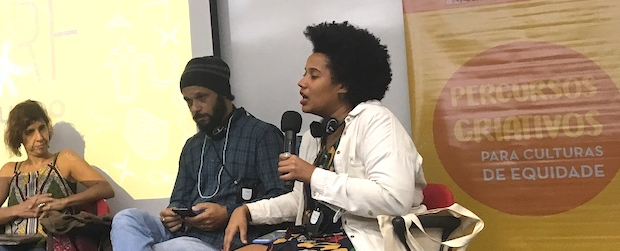
On Wednesday, May 8, the seminar “State Violence: The Resistance and Re-Existence of the Periphery” was held at the Pontifical Catholic University of Rio de Janeiro (PUC-Rio) as part of a three-day series called “Creative Pathways to Cultures of Equity.” The event was co-organized by Global Gender and Cultures of Equity (Global GRACE) in partnership with Brazil-based organizations Promundo Brasil, the Maria and João Aleixo Institute (IMJA), the Favelas Observatory, and PUC’s Department of International Relations; as well as the Mexico-based organization Voces Mesoamericanas and the Autonomous University of Chiapas. Mediated by Promundo’s communications coordinator Mohara Valle, the session included presentations from researchers, professors, NGO leaders, and local artists from across Latin America seeking ways to reduce violence among youth through creative and artistic outlets.
The session began with a video-streamed presentation from José Manuel Valenzuela, a researcher and professor in the Department of Cultural Studies at El Colegio de la Frontera Norte (COLEF) in Mexico. Valenzuela focused on violence against young people and women in Latin American countries, from Mexico to Colombia and Brazil. According to Valenzuela, we are witnessing “the growth of necropolitics in our counties—a policy of death whereby certain groups have the capacity to decide who deserves to live and who should die.” He elaborated on the parallels between current policies enacted in Brazil, where a black youth is killed every 23 minutes, and Mexico: “These are [essentially] the same young people that are being systemically assassinated in Mexico as part of an irresponsible war against supposed criminal organizations,” Valenzuela stated. “What we are observing is the criminalization of poverty.”
Valenzuela’s speech was followed by a presentation by Luciano Ramos, a project coordinator at Promundo—a global organization initially born in Rio de Janeiro that seeks to improve gender equality around the world as a way to reduce violence. The presentation focused on the influence of masculinity on youth in low-income communities and how this masculinity contributes to violence in Brazil. Ramos explained the mission of his organization, which works with young men and women to transform the concept of masculinity in order to reduce violence in the periphery: “What we have been doing at Promundo is working with boys, adolescents, young adults, as well as adult men in communities with the aim of changing the discourse on gender norms and understanding new concepts of masculinity.” Ramos stated that deeply ingrained gender norms and strong masculine identities are among the main causes of the violence and control sought by young men in urban peripheries, also contributing to violence against women in low-income communities.
Also participating on the panel was Raquel Willadino, human rights coordinator at the Favelas Observatory—a research, consulting, and public action organization based in the favelas of Complexo da Maré that aims to contribute to the formulation of effective public policies for Rio’s favelas. Willadino stated that the goal of her organization is to reduce social inequalities, strengthen democracy, and protect rights in these communities.
A highlight of the seminar was the insightful presentation and first-hand perspective of Shyrlei Rosendo, who is a member of “Enough Violence! Another Maré is Possible!“—a forum that connects Maré’s numerous associations, organizations, and residents to promote collective action, reduce violence, and find new ways to guarantee public safety. As a lifelong Maré resident, Rosendo gave a thorough history of the nearly eighty-year-old neighborhood, emphasizing the fact that nine out of Maré’s sixteen favelas were created as a result of state intervention, largely as housing complexes intended to accommodate residents displaced by the removal of palafitas (houses standing on stilts) in the area. She explained that the construction of the favela of Maré is intrinsically linked to the government-funded construction of Avenida Brasil, Brazil’s public national health institute known as the Oswaldo Cruz Foundation (Fiocruz), and the Cidade Universitária campus of the Federal University of Rio de Janeiro (UFRJ) given that these developments spurred settlement in the surrounding regions. Rosendo presented a history of the favela that many residents of Rio de Janeiro are unaware of and emphasized the importance of this history for creating present-day solutions. This common understanding is essential to the favela’s development and the guarantee of residents’ legal rights.
The second part of Rosendo’s presentation focused on the issue of public safety within the community of Maré. She raised questions about the presence of police and police operations in the favela and how they are viewed by the broader society in Rio. “Yesterday, I was asking myself if a police operation like this would be possible in Leblon, using helicopters above the plaza here,” she stated, calling into question the selective guarantee of public safety for a certain segment of society at the expense of another.
Police operations in favelas have, throughout history, impeded the lives of ordinary citizens and caused the unnecessary deaths of innocent people. Rosendo presented shocking statistics on the effects of police operations in the favelas of Maré. In 2017, Maré saw 41 police operations and 42 deaths resulting from government intervention. However, the negative effects of these interventions extend far beyond deaths alone. The operations have caused days and even months worth of school and health center closings, affecting the everyday life of Maré residents—especially youth.
Rosendo concluded her presentation by focusing on Maré’s long history of community organizing and resistance and how the community today can organize to better guarantee the safety of its residents. “I think it’s worth saying that the favela is not just a place of pain, but also a place of life,” she stated. She went on to describe the need for common spaces and movements in Maré to ensure public safety, emphasizing the importance of collective resistance and organizing. Rosendo’s dedication to community organizing within the favela, along with presentations given by the other professors, NGO organizers, and researchers showed the potential of collective action in generating solutions to issues of violence in the periphery.



